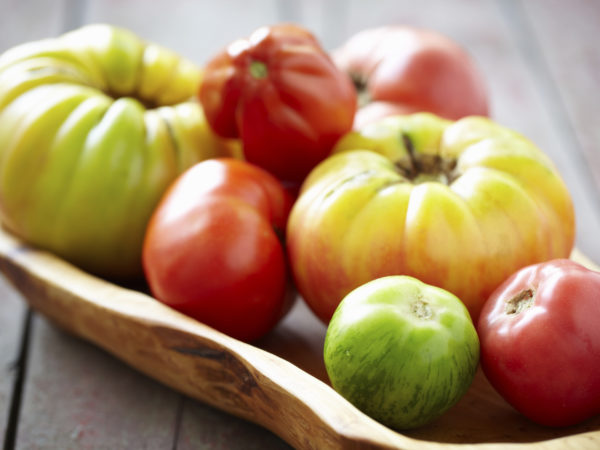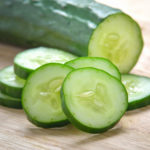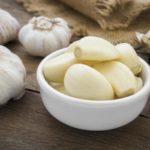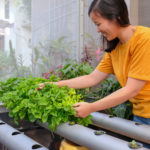Time for Tomatoes

Have you ever eaten a wolf peach? No, this isn’t the latest species-straddling half-breed the gene-splicers have set loose on our dinner plates. The botanical name for the tomato is lycopersicon esculentem, wolf peach, reflecting its shady past. As was once believed of many members of the nightshade family, the tomato was once thought to be poisonous.
The tomato is a New World plant brought back to Europe by the Spanish. Its common name is derived from the Spanish transliteration of the Aztec tomatl. It was also during its voyage across the sea that the fruit of the tomato plant became a vegetable. In the 1883 case of Nix vs. Hedden, a dispute over export/import laws, the tomato, though botanically a fruit, was legally deemed a vegetable by the U.S. Supreme Court.
The names are as tasty as the fruit; green tiger, sun leaper, empire, golden pear, ox heart, bloody butcher, the list goes on. In fact, there are over a thousand varieties of tomatoes and new ones are available every year. As the name implies, heirloom varieties, many of which are showing up in grocery stores around the country, were once commonly grown. They became scarce as newer cultivars proved hardier.
We have grown several heirloom varieties in Dr. Weil’s garden with mixed success – Arizona’s extreme climate is tough on many of them, probably because they originally came from cooler, wetter climes with friendlier soil structures. Mostly we grow hybrids. Hybrids are bred for disease resistance, heat/cold tolerance, shelf life or appearance. Unfortunately, root knot nematodes inhabit our soil. They are parasites that club and distort roots. Many of our other vegetable plants do well with gnarled roots, but we have found that generally, nematode-afflicted heirloom tomato plants will not set fruit.
I get our tomato seed from several sources. Totally Tomatoes, a subsidiary of Park Seed, stocks common and novel varieties. I often buy seeds from Seeds of Change or Territorial Seed. The varieties I grow are probably far different from what grows in your climate. Though tomatoes need heat and sun to ripen, our relentless Arizona sun will split most of the bigger varieties. Because of the extreme heat, our tomato plants go into a stasis through the heat of June and flower well again only if our July monsoons are adequate.
Tomato seed varieties will always be listed as determinate or indeterminate. Determinate varieties have a sturdier, more upright structure and produce one big crop with little after-production. Indeterminate varieties are more vine-like plants that produce a first crop and continue to produce reliable after-crops.
Tomato seeds should be started a couple of months before your last frost. The soil needs to be warm for the seed to germinate, so you can start them on a bright windowsill, a radiator that doesn’t get too hot or on top of the refrigerator. A yogurt cup, some potting soil and a little water are all you need to start, and, of course, the seeds you saved out of the organic, non-hybrid tomato you bought at the farmers’ market. You can expect the plants to get tall – ask the farmer, or see the seed packet to find out how tall – and they’ll need to be staked. There are hybrid varieties selected for their compact nature and even container-sized plants.
We eat tomatoes because of their pleasant and refreshing taste. Ripe tomatoes are abundant in vitamin C, biotin, vitamin K and carotenes. The carotene known as lycopene has been shown to slow macular degeneration.
If you can’t grow your own tomatoes, I recommend buying organic varieties because the residual pesticide levels on tomatoes are rather high. It is significant to note that unripe fruit is generally not as nutritionally rich as ripe fruit, so when buying tomatoes, go for good color and a uniform and firm texture. Vine-ripened tomatoes, by the way, need only show a little color on the vine to be called vine-ripened. They are then gassed with ethylene, a ripening agent, before market.
But if you’re interested in controlling what goes into your food and into your body, try growing tomatoes organically. It’s easier than you think, healthier, and less costly to your wallet and the environment.
by Jace Mortensen, Guest Commentator
DrWeil.com News












